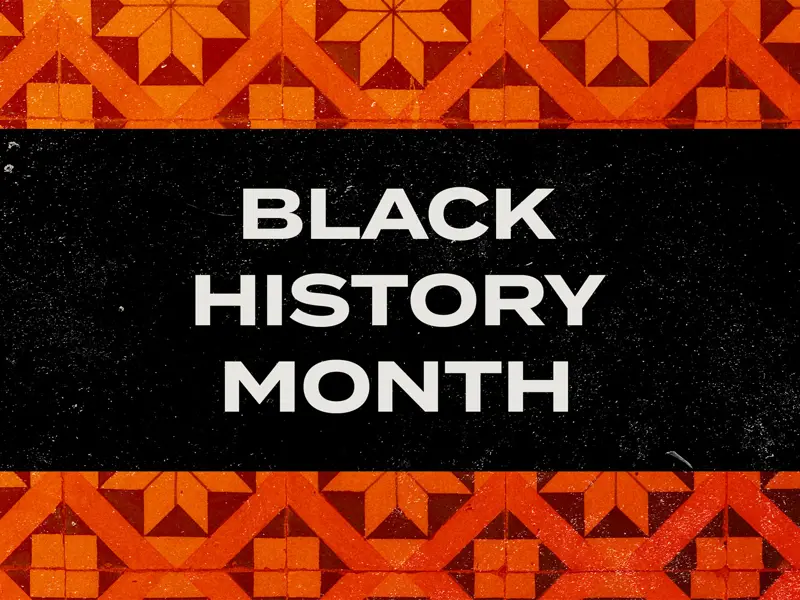Reasons to Celebrate Black History Month

Every year since the 1920’s, the month of February has been recognized as Black History Month. History shares that it was Carter G. Woodson, known as the father of Black History, who set out in 1926 to designate a time to promote and educate people about Black history and culture. Now in the year 2023, there is a continued need to promote and educate the greater community on the essential reasons to celebrate Black History. There are innumerable reasons to celebrate and in keeping with the spirit of Roberts Wesleyan University to recognize and acknowledge the heritage of the “Imago Dei,” those made in the image of God, below are four overarching reasons to celebrate Black History Month, including recognizing the achievements of Black honorable influencers right here in Rochester.
- Remember the past and look to the future - During Black History Month, it is crucial to educate about the past to understand, reflect on, and learn about the oppression inflicted on Black people and the difficulties they faced in order for history not to be repeated. In doing so, we are not only remembering the past for this purpose but also looking to the future by helping to shape and form better future generations.
- Honor and recognize the stories - Black History Month is a time to celebrate the resilience and success stories of Black people. It is a month to acknowledge all the achievements, victories, discoveries, talents, and inventions accomplished by people of African and Caribbean descent. Right here in Rochester, most of us know about the contributions of Frederick Douglass from his founding of The North Star publication to helping the enslaved of African descent find their way to freedom via the Underground Railroad. Perhaps lesser known to some include the achievements of the following individuals, to highlight a few:
-
- Hester C. Jeffrey was an African American woman who came to Rochester in 1891 and founded a number of Black women’s clubs, including the Susan B. Anthony Club for Black women, which fought for women's voting rights and formed a Mother’s Council to help support women with young children. Jeffrey also was the founder of the Hester C. Jeffrey Club, which helped financially support and enable young Black women to enroll in classes at what is now known as the Rochester Institute of Technology.
- Dr. Charles T. Lunsford was Rochester’s first licensed African American physician, who opened his private practice in the city of Rochester in 1921. Lunsford was known for persistently fighting for civil rights issues that when he passed away, he was called the Martin Luther King of Rochester. Lunsford paved the way for Black doctors in Rochester who followed him by successfully advocating to enroll Black students at the University of Rochester medical school. He fought to end segregated workforces of local Rochester companies and establishments including Eastman Kodak Co. and guest rooms of the YMCA. Lunsford also fought during WWII to overturn a policy of the American Red Cross restricting the use of blood of Black donors.
- Dr. Walter Cooper came on staff as a research scientist at Eastman Kodak Co. in 1956 and was the first African American to earn a Ph.D. in physical chemistry from the University of Rochester in 1957. During his time at Kodak, Cooper achieved three patents. He not only had a phenomenal career trajectory, Cooper also was an advocate which entailed involvement in community development and civil rights issues. Cooper developed an anti-poverty agency in Rochester called Action for a Better Community, Inc. and co-founded the Rochester branch of the Urban League. In 2008, Cooper was honored with the Frederick Douglass Medal from the University of Rochester in acknowledgement of his lifelong work in the area of civil rights.
Black History month is a time to recognize Black heroes such as these and highlight that without these individuals, we wouldn’t be where we are today, and we wouldn’t be moving towards more positive change.
- Look to the future with hope - Stories you hear about during Black History Month have had a positive impact on people by giving them hope and have helped shape the world to what it is today. This is not to say that there still isn’t work to do and systems that need to be changed so that the future of Black people is offered on a level playing field. If we all desire fairness, then we need to create environments where inequality is not tolerated. Environments that have a clear commitment to diversity, equity, and inclusion are essential. Roberts Wesleyan University and Northeastern Seminary are devoted to these values and desire to be held accountable to these beliefs by our community to assist with our growth and change for the better.
- Share the rich heritage of Black history which is not just about slavery - In our education system, we tend to only explore a glimpse of Black history which usually looks at slavery and the related events that took place. Instead, it is essential to illustrate Black history that is balanced and also focuses on the kings, queens, nations, scientists, inventors, artists, entrepreneurs, pioneers, etc. who have made favorable contributions to the United States and the world and have forever positively influenced our lives and culture. At Roberts Wesleyan and Northeastern Seminary, we seek to offer this balance and the sharing of the rich legacy and advancements of Black people by implementing more inclusive curriculums that consistently highlight the work of Black professionals in our STEM and liberal arts fields as well as proposing to offer an African American Studies course and launching the Black Church Studies certificate program.
The challenge and opportunity for all of God's Imago Dei is to be intentional and transparent to express the transformative power of God to bring cultures and generations back to God and in relationship with one another. As we approach February and beyond, look for the various opportunities to celebrate Black History at churches and community events and at Roberts Wesleyan University and Northeastern Seminary. A list of local events as well as resources for Black history are provided below.
Dr. Fredrick Johnson Sr.
Assistant Professor of Christian Ministry
Director of Field Education & Black Church Studies
Dr. Sonnette M. Bascoe
Special Advisor to the President for Diversity & Belonging
Resources:
Dr. James Wright, manager of the Rochester Public Library's Phillis Wheatley branch, commissioned a project to record the oral histories of African-American Rochesterians in the 1970s and early 1980s. The oral history can be found at:
Black History Events Happening in Rochester:
City of Rochester’s Black Heritage Committee presents Black Resistance: Powerful and Resilient
Sickle Cell Awareness Event & Red Cross Blood Drive; 02/01/23 from 4-8 pm; School Without Walls- 480 Broadway, Rochester
Black History Month Creative Painting Celebration; 02/07/23 from 5:30-7 pm; 1 East Main Street, Suite 950A, Rochester
Black History Month DeTOUR; Join Calvin Eaton of 540WMain to take a look at Black history in America and learn more about Black art and culture; 02/09/23 at 6 pm; Memorial Art Gallery of the University of Rochester; 500 University Ave., Rochester
Rochester Philharmonic Orchestra (RPO) kicks off Black History Month with Rooted in Rochester: A celebration of Black Composers; 02/09/23 at 7:30 pm & 02/11/23 at 8 pm; Kodak Hall at Eastman Theatre;
Tickets for all Kodak Hall shows start at $24/$12 for children ages 3-17 and are available online anytime at rpo.org, by phone at 585-454-2100 (Monday-Friday,10 AM-5 PM), and in person at RPO Patron Services at 225 East Avenue (Monday -Friday, 10 AM-5 PM) and one hour prior to curtain at the Eastman Theatre Box Office (433 East Main St.).
